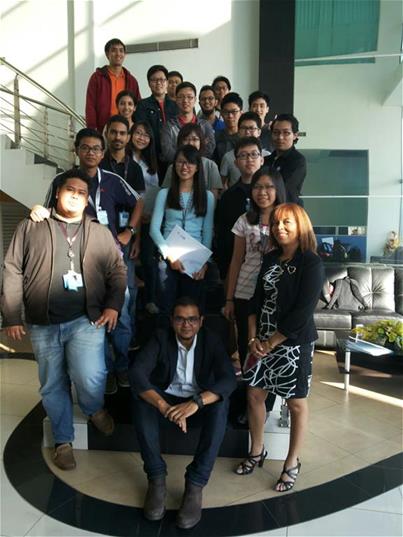The rise of big data has driven global organisations, including Hewlett-Packard, to beef up on the application of data analytics in the study of market behaviors, as well as to predict emerging trends and support business growth. INNOVATE@ISS with the full story.
'Big Data' has revolutionised businesses across almost every industry. It's been estimated that humans currently create more data in two days, than we did from the dawn of civilisation up till 2003.
While vast volumes of data have made it possible to accomplish things that were previously impossible, such as spotting new trends of using predictive analytics to improve sense of the data that's important.
Organisations like Hewlett-Packard (HP) have been among the many who are stepping up on analytics training, equipping process engineers with the ability to interpret data effectively, and to apply powerful statistical analysis to derive factual insights for enhanced business decisions.
To support the high-precision work at a new facility in Penang, HP Malaysia Manufacturing has been equipping its process engineers with the statistical tools and knowledge to meet its exacting quality control standards.
Choosing the right training partner

The participants from HP with the trainers from NUS-ISS
It helps that the training partnership between HP and NUS-ISS is well established. "We've been working closely with HP Singapore over the past few years, specifically to train senior engineers in the area of predictive analytics," says Catherine Khaw, Chief of Intelligent Systems Practice at NUS-ISS.
HP has also been engaging the NUS-ISS' Master of Technology students specialising in knowledge engineering and business analytics as interns, with a number who have gone on to become full-time HP employees.
HP recently approached NUS-ISS to develop a suite of training programmes to support the new Penang operation, which is part of HP Malaysia Manufacturing (HPMM), a separate entity formed in Malaysia to support consumer ink supplies business.
"We do understand their training objectives and are familiar with the system and constraints. As a result, we were able to design and deliver a more focused and comprehensive training package that would give the trainees greater confidence to apply what they've learned back at HP," explains Catherine.
Grooming data detectives
The training package covers three courses:
- NICF - Statistics for Business, a foundational course on statistical techniques for evidence-based decision-making;
- NICF - Statistics Bootcamp Using R and Tableau, which equips students with the methodologies for R programming and data visualisation; and
- NICF - Predictive Analytics, which empowers students to derive insights of trends and irregularities from data, and applying them in forward-looking situations.
"These courses were put together to give students the basic tools to become better data detectives; a bit like how Sherlock Holmes might have used data to formulate more accurate hypotheses and draw better conclusions!" says Catherine.
Customised curriculum
While the learning roadmap catered to trainees from the basic to advanced levels, students were also encouraged to bring along actual operational scenarios for the classroom discussions. And instead of demonstrating the statistical concepts and processes using the usual SPSS software, lessons were taught on the JMP software used by all the engineers at HP.
"With corporate clients, we're able to adjust the teaching material to suit the learning outcomes, and be more flexible with the training schedules and location. In fact, for the 60 HP students enrolled under this training initiative, we're even conducting the courses in Penang," Catherine points out.
Achieving results
Mohd Ismail Bin Ahmad Sinin, HP's Engineering Manager, tells INNOVATE@ISS that data analytics training has enabled his team to move towards predictive quality control and maintenance in their work, "One example is the analysis of vibration data from the machine - now the ops team is able to analyse its performance and anticipate any potential breakdown or impact to quality."
"We're pleased that NUS-ISS has a comprehensive training syllabus on business and data analytics," says Mohd Ismail, citing the NUS-ISS interns who have demonstrated a good depth of knowledge on the topics.
"I think it's important for team members to understand what's possible with analytics, statistics and big data. So far, those who've attended the introductory module have found the course helpful," he added, highlighting the benefits of learning in an environment and using software tools that they were familiar with.
|
INNOVATE@ISS also spoke to Chin Jia Jie, a process engineer with HP Malaysia Manufacturing, who attended the course on Statistics for Business.
What were your expectations before the course?
I was hoping to pick up some basic statistical tools and techniques, such as box plots, for organising data points.
So, what did you like best about the course?
Well, I like learning about the thinking process behind data interpretation. I also liked how the trends and stories become evident, once we know how to deal with the data.
How have the lessons benefitted you at work?
After the course, I've been practising the lessons on JMP software using chunks of data from the production line. It definitely pays to be able to execute analysis in a more efficient and productive way.
Would you recommend the course to your colleagues or industry peers? Why?
I personally enjoyed the short training and was able to enhance my current skills with the practical takeaways. Would like to learn even more if given the chance, and yes, I'd definitely recommend these courses to my colleagues and peers.
|
To find out more about our Analytics & Intelligent Systems suite of courses, click here